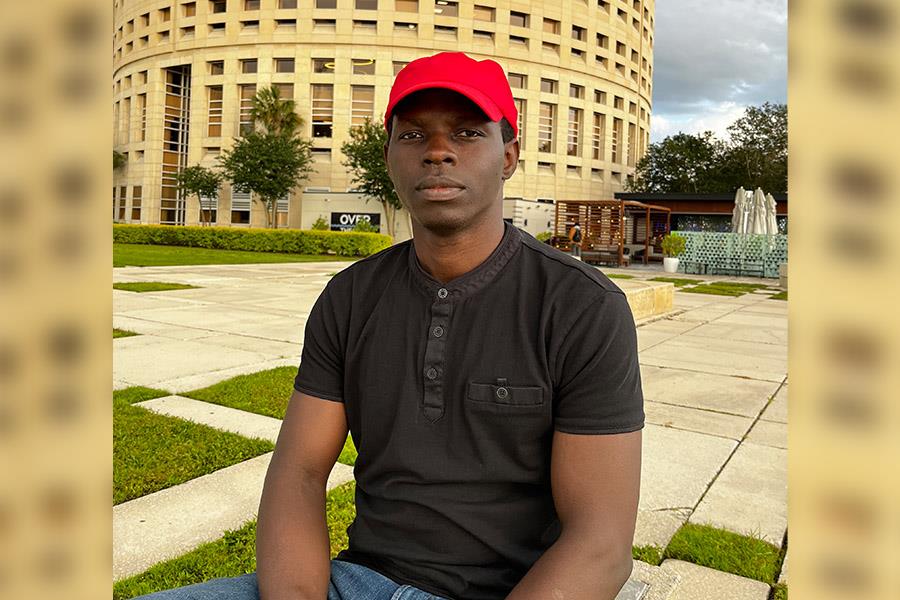Student Spotlight: Samuel Adewale Adegboyega

Samuel Adewale Adegboyega is a doctoral student in the Department of Chemistry and Biochemistry, part of Florida State University’s College of Arts and Sciences. His research interests reside in the field of physical and inorganic chemistry, and he is originally from Ogbomoso, a city in Oyo State Nigeria. Adegboyega hopes to graduate from FSU with his doctoral degree in Summer 2026.
What inspired you to pursue a doctoral degree in chemistry?
Chemistry has been my favorite subject since I was in high school. I earned my bachelor’s degree in pure and applied chemistry from Ladoke Akintola University of Technology in 2014 and a master’s degree in chemistry from the University of Ibadan in 2017, both in Nigeria. Since earning these degrees, I’ve taught chemistry courses in various high schools and undergraduate programs. However, earning my doctoral degree in chemistry would allow me to attain the highest level of education in the field and acquire access to quality scientific research and collaboration with talented scientists across many disciplines. I’m also interested in certain professions in chemistry such as becoming a professor or a research scientist, so this degree will propel me towards fulfilling those goals.
Tell us about your research assistantship in the Shatruk Research Group. What is your role in the lab? What does a typical day in the lab look like? What is the goal of your research?
In the Shatruk Research Group, my primary assignment is to research on how properties of magnetic materials can be manipulated and controlled by pressure, temperature, magnetic field, or changes in chemical composition. Besides daily experimental research in the lab, I regularly present my research results at a personal meeting with my principal investigator, at subgroup meetings with my lab peers and principal investigator, and at larger meetings with the whole lab and our collaborators. At the end of each semester, I write a research report and discuss plans for the next semester with my principal investigator.
A typical day in the lab includes making new samples, sealing silica tubes using a flame torch, carrying out reactions, using instruments for characterizing my samples, reading manuscripts, writing reports, undertaking more training to develop my research skills, and collaborating with my colleagues.
What do you want the public to know about your research? Why are your topics important?
My research area is in solid-state inorganic/material chemistry and focuses on making new materials or modifying the structural and magnetic behavior of already known chemical materials. Some of these processes include high-temperature flux synthesis using an electric furnace, arc melting technique and radio frequency induction technique. These processes are crucial to changing the magnetic properties of certain chemical compounds from conventional behavior to unique magnetic states. Such magnetic states often emerge that can lead to exotic magnetic properties with potentially new applications in the field of chemistry and beyond.
What aspect of your areas of study do you find most rewarding?
In all areas of my research, I see studying chemistry at the doctoral level as an opportunity for advanced training as there’s so much to learn from my experienced professors, principal investigator, co-advisers, collaborators and colleagues. I apply this knowledge to my research every day and have already made many improvements in my research on intermetallic compounds. I also enjoy handling various high-tech instruments at FSU such as the single crystal X-ray diffractometer, the energy dispersive X-ray spectrometer/scanning electron microscope, the Magnetic Property Measurement System and many others. Additionally, I appreciate working with collaborators at Oak Ridge National Laboratory in Oak Ridge, Tennessee, and scientists at the National High Magnetic Field Laboratory at FSU.
What on-campus resources have helped you achieve success?
The on-campus resources I have benefitted from most include University Libraries, the chemistry department’s student advising, the Center for Global Engagement’s international advising, and University Health Services.
Are there any faculty or staff who have helped or inspired you?
I currently work most closely with Xinsong Lin, associate in research at the Mass Spectrometry Laboratory & X-Ray Crystallography Facility and Raaj Winfred, research specialist at the Materials Characterization Lab Facility, both in FSU’s Department of Chemistry and Biochemistry. Some of my best professors in the Department of Chemistry and Biochemistry include Michael Shatruk, Susan Latturner, Wei Yang, Biwu Ma, and assistant professor Bin Ouyang. The courses taught by each of these talented faculty have improved my research approaches and reasoning. Lori Henley, the graduate affairs coordinator in the Department of Chemistry and Biochemistry, has also helped me significantly through her academic advising.
Following your graduation, what are your plans? Even though you might miss FSU, what are you looking forward to once you graduate?
I’m looking forward to applying the skills, experiences, and knowledge from my graduate research to solving global scientific problems, making innovations, and working toward discoveries. I’m currently preparing for positions such as research or teaching personnel in industrial or academic fields.
What advice do you have for fellow students? What advice do you have for undergrads?
Studentship is an opportunity to learn and undergo vast interdisciplinary training. The skills and experiences acquired during this time can prepare you for future opportunities and challenges. Your future is beckoning you to prepare to solve its forthcoming challenges while the present is awaiting your competence to end previous challenges. Break through all odds that might prevent you from fulfilling these responsibilities, and aspire to leave the world better than you met it.
